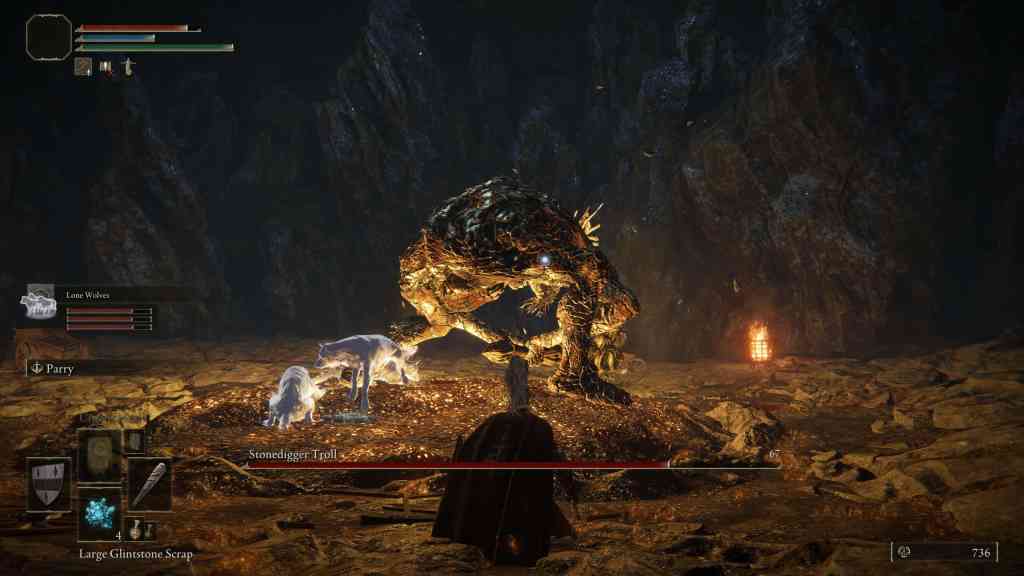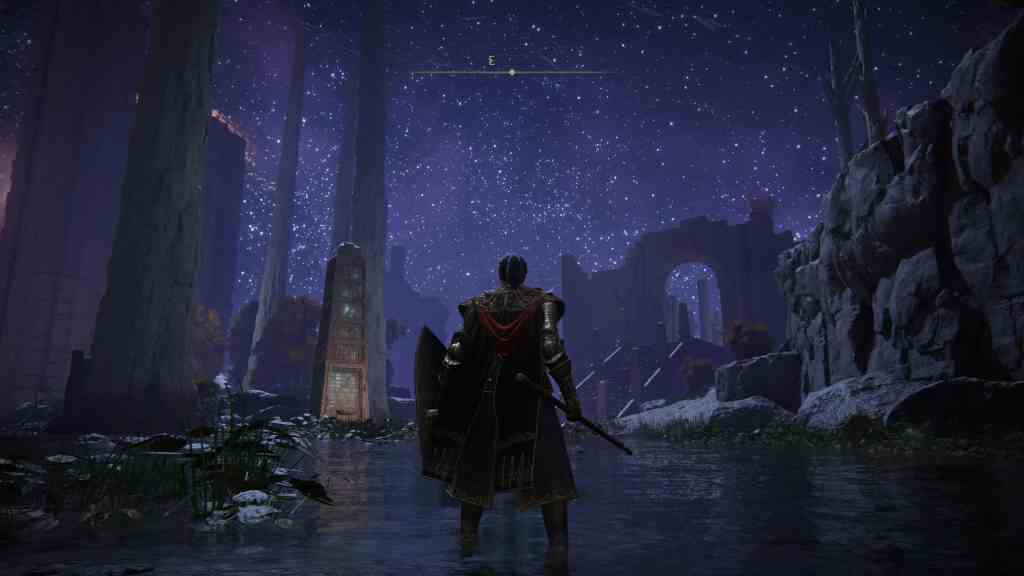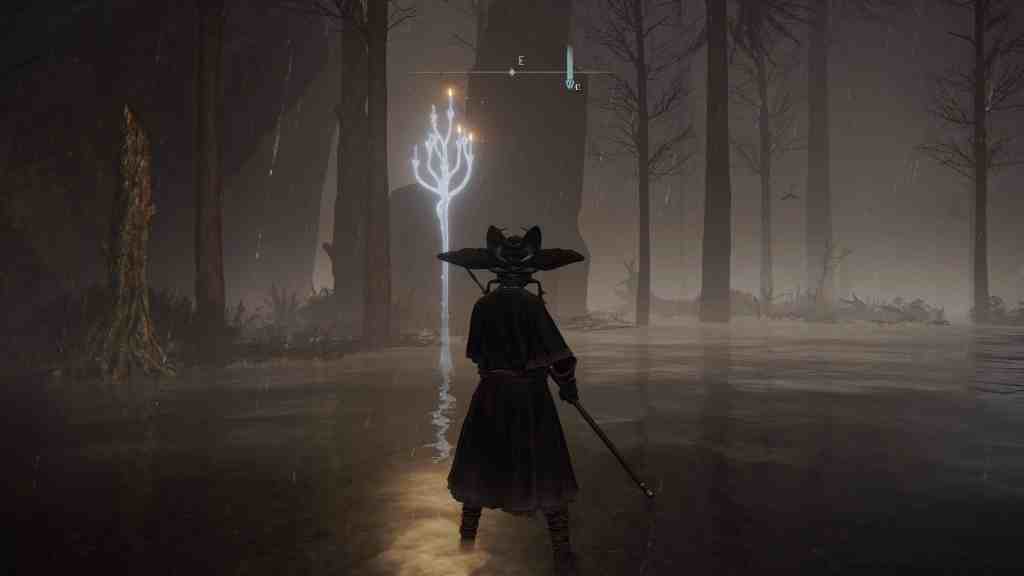I couldn’t believe it at first. In Elden Ring, I could raise my shield to block my enemy’s attack, then counter-attack to stagger them, followed by a devastating critical hit. All with a mere couple of button presses, delivered with leisurely timing and without any risk to my own health. How was this possible?
The game’s tutorial had just introduced me to the Guard Counter, one of several new concepts not found in FromSoftware’s previous games. At first, it seemed like cheating. An overpowered move capable of taming otherwise deadly enemies. A win button free of consequence. Players new to the Souls series tend to retreat behind their shield, fearful of the games’ reputation for danger lurking around every corner. And here was Elden Ring rewarding them for doing so.
Yet, as with so many things in a FromSoftware game, first impressions are deceptive. When deployed at the appropriate moment, the Guard Counter is a formidable move. However, after encountering enemies who didn’t stagger when I tried to counter attack, or whose follow-up attacks were so rapid they interrupted my counter, I learned that its usefulness only extended so far. Eventually, I recognised the Guard Counter as a handy tool that, by turning defence into attack, leverages the inexperienced player’s first instinct into an effective – if not infallible – weapon.

Millions of inexperienced players are having their instincts put to the test in Elden Ring right now. Three weeks on from its February 26 launch, Elden Ring had sold twelve million copies, according to publisher Bandai Namco. On March 3, it peaked at just under one million concurrent players on Steam (953,426, to be precise). By way of comparison, FromSoftware’s previous best-selling game, Dark Souls 3, has sold around 10 million copies in nearly six years. And its peak number of concurrent players on Steam is around 130,000, recorded shortly after its launch in April 2016.
It’s clear that a lot of people who have never played a Souls game are playing Elden Ring. And perhaps FromSoftware knew this would be the case when they designed new features, such as the Guard Counter, that offer a supportive foundation for players who are learning what a Souls-style game is all about.
Read: Elden Ring: 10 tips every player should keep in mind
In many ways, Elden Ring is the FromSoftware game that is most welcoming to new players. It is certainly its most generous. Yet despite the studio’s reputation for brutally hard combat and punitive design, this isn’t an abrupt volte-face. The developer has always been keenly aware that players may appreciate assistance in overcoming the challenges it’s set for them. It’s just that this time, the studio is offering more helping hands than ever before.
None of the games that have forged FromSoftware’s reputation over the past 13 years – from Demon’s Souls to Sekiro – have conventional difficulty settings. Elden Ring doesn’t break with tradition in that regard. But all these games allow players to make things harder or easier for themselves in a variety of ways. Here, Elden Ring expands on these aspects to such an extent that it feels like the result of a deliberate effort to accommodate a new and wider audience.
Of course, like all Souls games, one of Elden Ring’s primary thematic concerns is the doomed heroism that arises through repeated failure in the struggle to overcome the seemingly insurmountable. So when it comes to aiding the beleaguered player, nothing quite so crass as an easy mode would align with the developer’s aesthetic goal. FromSoftware unwaveringly believes there are more interesting ways to allow players to tailor challenges to their ability.

Some of these methods are obvious. As in previous games, you can summon other players to your world to assist you through a particular area, or to fight a specific boss. It’s not given for free – bosses are adjusted on the fly to be slightly stronger in co-operative multiplayer – but the advantage of having another player around to occupy the enemy’s attention while you heal more than compensates. Elden Ring goes even further with a catalogue of AI characters, known as spirit summons, that players can collect, upgrade and deploy in predefined locations to lend a hand in combat. You don’t have to use spirit summons, but they almost always make an encounter more manageable. And even if you don’t need the assistance, it’s simply more enjoyable to fight alongside your own pack of wolves, or a headless warrior, or even a floating jellyfish that shoots poison.
Other methods are more subtle. The game’s message system, where players can write short notes to be read by other players, is often derided as a haven for trolls, yet more evidence of FromSoftware’s sadistic bent. And while it’s true that the messages left throughout the lands of Elden Ring can occasionally lead you astray, the majority are concerned with offering helpful directions, pointing out hidden paths and imminent danger, or simply making witty observations and in-jokes that provide much-needed levity amid the death and decay.
Perhaps the most significant shift to the way FromSoftware prepares players for challenges comes in the shape of Elden Ring’s open world structure. In the previous games, where progress was much more linear, players were typically limited to tackling no more than a couple of areas at a time. If you struggled to defeat a certain boss, there often wasn’t anything else you could do but keep at it. Indeed, it’s a common refrain among players who have bounced off a FromSoftware game in the past – they stopped playing because they hit a boss they couldn’t beat.

Elden Ring’s surprisingly vast open world, coupled with its liberal fast-travel system, allows you to explore in many directions at once. You’ll still run into brick walls all over the place, but instead of beating your head against them, you’re free to head off elsewhere until you find the sledgehammer you need. And with so many more avenues to explore, you’re constantly levelling up, improving your character’s capacity to survive and deal damage, and finding new gear to augment the tools you bring to any challenge. Hours later, equipped with more health, some new spells and a bigger axe, you’ll return to one of those brick walls and discover you’re now capable of bringing it tumbling down.
The open world has also led to FromSoftware rethinking the way it teaches the player. Souls games were built around the idea of repetition, of a kind of slow tempering as you gradually work your way through a level from one bonfire to the next. The designers knew you’d spend a lot of time running a groove through the same locations, so they were content to keep guidance to a minimum, and let players make discoveries at their own pace. Besides, anything other than a subtle approach would become tiresome through repetition.
Given Elden Ring’s open world structure inevitably means players are less likely to pick up on subtle environmental clues, or note the meaningful placement of certain items, particularly as they charge across the landscape on horseback, the developer has made many concessions to the manner in which information is conveyed to the player. Sometimes it is startlingly direct – Elden Ring probably has more tutorial pop-ups than all the Souls games combined. But sometimes – as, for example, you examine a glowing candelabra in the swamp and follow a ghostly apparition through the belching mud to a secluded cave you’d never noticed before – you understand that FromSoftware is interested in making its games more approachable on its own esoteric terms.

More than all that, though, the open world of Elden Ring leans into the shared wisdom of the community. There are more secrets here than ever before, there’s more advice to give on where to go and what routes to take and which items to grab first, more opportunities to connive powerful character builds that require foreknowledge of the most suitable gear. The sheer scale of Elden Ring means there’s so much more space for the community to fill in and exchange. Indeed, perhaps its real difficulty setting is measured by how much you engage with its community, both in-game and out.
Elden Ring, like Demon’s Souls, Dark Souls, Bloodborne and Sekiro before it, deliberately doesn’t tell you everything. They leave room for you to reflect on events and chew over the morsels they serve. It’s a space, not just for imagination to take hold, but a venue for a community to gather, to share discoveries and secrets and strategies. A community that now numbers in the millions, and is reaping the benefits of a developer that has proved itself generous and accommodating, without abandoning what made it so distinctive.





